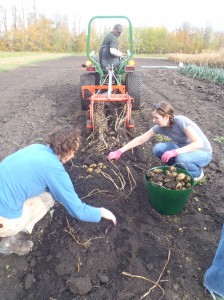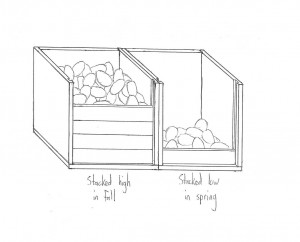Potatoes? You gotta be poor to eat potatoes. Real poor.
-Tuco Ramírez in The Good, The Bad, and The Ugly
 The importance of potatoes to my family was a slow revelation. I always knew from off-hand, quietly resentful remarks that when my parents were young they spent a lot of time tending to potato patches. Only recently did I fully understand the role potatoes played in their lives.
The importance of potatoes to my family was a slow revelation. I always knew from off-hand, quietly resentful remarks that when my parents were young they spent a lot of time tending to potato patches. Only recently did I fully understand the role potatoes played in their lives.
We usually consider bread to be the embodiment of simple, gratifying food. References to bread in European history, mythology, and religion are too numerous to count, but here are some highlights. Ample supplies of bread have often been the foundation of political stability. During the long period of decline, Roman emperors are said to have placated the masses with “bread and circuses,” that is, by giving away bread and hosting spectacles like the gladiatorial fights. On the other hand, bread shortages incited riots during the French Revolution, which prompted Marie Antoinette’s infamous proposal: “Let them eat cake”. The Bible is replete with references to bread, where it is the main symbol of bodily nourishment. The two most notable references are in the Lord’s prayer (“Give us this day our daily bread”) and the breaking of bread during the last supper before Christ’s death, which became the central sacrament of the Christian faith, in the form of communion.
Potatoes, being native to America, were unknown to Europe until the sixteenth century, weren’t widely eaten there until the nineteenth century, and even then were considered peasant food. They don’t have the benefit of biblical references, to say the least.
My parents grew up on farms in Ontario, and while they did bake bread at home, potatoes were the staff of life. My mom ate potatoes twice a day almost every day of her childhood, usually fried potatoes with lunch and boiled potatoes with dinner.
 Her family grew them in huge quantities to last the winter. They were stored in the cool basement in crates with three solid walls and a fourth wall made out of slats stacked and held in place by grooves. The potatoes were sprinkled with lime (the chemical, not the fruit) to prevent rot.
Her family grew them in huge quantities to last the winter. They were stored in the cool basement in crates with three solid walls and a fourth wall made out of slats stacked and held in place by grooves. The potatoes were sprinkled with lime (the chemical, not the fruit) to prevent rot.
With this in mind, following are some dishes to celebrate the potato: dishes befitting the nourishing, comforting, hearty character of the tuber. I hope to expand this section greatly in the coming months!